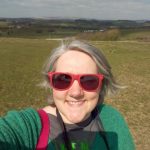Tell us about your contribution that has been recognised through the professorship.
My professorship has been awarded on the basis of an outstanding contribution to Research and Innovation (R&I), as well as Academic Citizenship and Leadership (AC&L), and a significant contribution to External and Professional Engagement (E&PE).
I’ve been a researcher at Hallam since 2003, so have worked my way up from Research Associate to Professor by being what is sometimes called a ‘jobbing researcher’, i.e. working on lots of externally funded/commissioned work, though also some regulated research income that I have designed/secured too. Alongside completing lots of research projects I’ve always tried to disseminate the work both academically, so contributing to the REF (Research Excellence Framework), and in ‘the real world’ – trying to have impact on policy, practice, and public opinion/awareness. That’s often felt like a tough juggle, with ‘balls’ of different sizes at any one time (obtaining income, delivering projects, presenting and publishing, disseminating and working towards impact, leadership work within the University, PhD supervision, etc), but if I’ve ever ‘dropped a ball’ I’ve always picked it back up again!
What does it mean personally to you to be a professor at Sheffield Hallam?
I think it’s important for those working on research contracts to see that there is a career/progression route for people who don’t do as much teaching, as I’m not sure that’s always been clear. I also think it’s important for women and other under-represented groups of people to see themselves amongst the Professoriate, so for those reasons – as well as personal ones – I’m chuffed to be here, and have my work recognised. Funnily enough it comes in the same year I’ve got my three days annual leave ‘loyalty award’ too!
Tell us a bit about your career story so far.
When I finished my first degree (BA in Sociology) I didn’t know what I wanted to do, but I knew I enjoyed studying, so I thought I’d do another degree (MA in Women’s Studies). After that I thought: “What job is closest to being a student?”, and came up with being a researcher, so I kind of feel like I fell into this career. I initially worked for a Labour M.P., and then a research consultancy company in the private sector, which was less my bag! My partner encouraged me to apply for the job at Hallam, and I’ve been through many research centre names and configurations since then, but basically have always been a qualitative social researcher.
My research interests have become more focused over the years from a broad interest in young people to a more specific emphasis on LGBTQ+ young people and their experiences of schooling and youth work, with an accompanying interest in experiences and understandings of space, place, belonging, and community among LGBTQ+ people of all ages. I’m also interested in all young people’s experiences of formal and informal learning about sex, gender and sexuality, and how these are addressed (or not) within the formal school curriculum, e.g. within PSHE (personal, social, health and economic education) and SRE (sex and relationships education) or RSE (relationships and sex education). All of my publications are in those areas, and a number of them formed the basis of my PhD by publication in 2017.
If you could go back in time and give yourself some career advice, what would it be?
I think all people can do is their best, get support when they can, and record everything – because at some point you get to write about all those things people have said about you (the good things!), and all the things you did because someone asked you to!
Oh, and learn to say no – I used to do so many presentations and journal reviewing because I was invited to, until I gradually started to have the confidence to only say yes to the stuff I was most interested in, or thought I could realistically manage without getting too stressed! I guess try think a bit strategically about what you do, so you’ve done a bit of everything internally and externally, or as much as you can/feel able anyway. Personally, I think there should always be a balance between a career and a life outside of work, so keep that in mind too…
Don’t be afraid to work on little projects, even if there is a push to always go big – the little projects can lead to larger projects, and you can still write and have impact from small-scale research. If you think it’s worth doing/that there is a gap or a need for it, then try and make it happen!
Also don’t be afraid to work with people outside the University, whether that’s other academics or practice-based organisations, because again you never know what things might lead to down the line.
I didn’t find it easy to write the application and ‘big up’ the things I’ve done (I once forgot to include my PhD in my CV!), so help from colleagues was helpful for that. I’d recommend talking to people and getting comments on drafts to give you the encouragement to go for it!
What’s next? Tell us about how you want to further develop your contribution.
In the future I will be continuing my research, with a plan to extend my regulated research income and international work. I will also maintain and increase my track-record of academic publication and PhD supervision. There’s never been a more important time to understand and be vocal about LGB, and particularly trans, inclusion and equality!